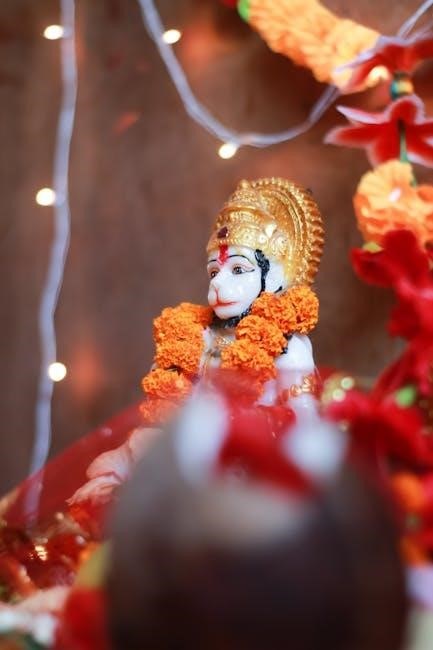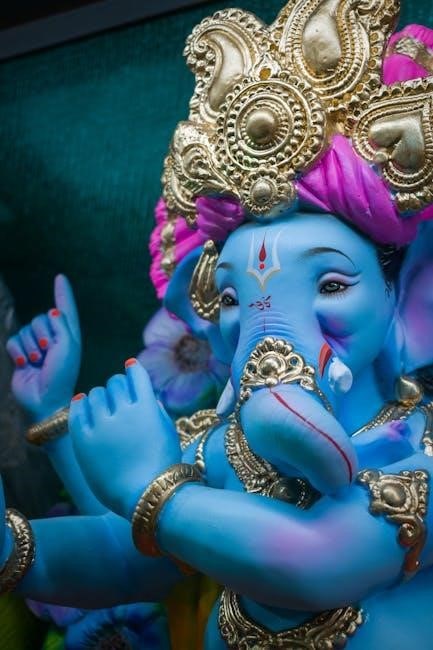Hanuman Chalisa in Hindi PDF: A Comprehensive Guide
The Hanuman Chalisa, a sacred hymn, is readily available in Hindi PDF format. This accessibility allows devotees to easily download, print, and read this powerful prayer dedicated to Lord Hanuman. The PDF format ensures convenient access on various devices, promoting spiritual connection and recitation anytime, anywhere.
The Hanuman Chalisa is a devotional hymn dedicated to Lord Hanuman, revered as a symbol of strength, devotion, and courage. Composed by the poet Tulsidas in the Awadhi language, it consists of forty verses (excluding the introductory and concluding couplets), hence the name “Chalisa.” This sacred text encapsulates the life, virtues, and divine powers of Hanuman, making it a cherished prayer among Hindus.
Tulsidas, a renowned saint and poet, crafted the Hanuman Chalisa as a means to connect with Lord Hanuman and seek his blessings. The verses narrate Hanuman’s unwavering devotion to Lord Rama, his selfless service, and his extraordinary feats. Reciting the Hanuman Chalisa is believed to invoke Hanuman’s divine presence, offering protection, strength, and guidance to devotees. Its simple yet profound language makes it accessible to people of all ages and backgrounds, fostering a deep sense of faith and devotion. The hymn’s enduring popularity is a testament to its spiritual power and the unwavering faith of millions who seek solace and inspiration in its verses. The Hanuman Chalisa serves as a reminder of the importance of humility, service, and unwavering devotion in the pursuit of spiritual growth.
Significance of Hanuman Chalisa
The Hanuman Chalisa holds immense significance in Hindu tradition, revered for its spiritual power and transformative effects. Reciting this sacred hymn is believed to invoke the blessings of Lord Hanuman, known as the embodiment of strength, devotion, and selfless service. Devotees turn to the Hanuman Chalisa for solace, guidance, and protection from negative energies.
One of the key significances lies in its ability to alleviate suffering and overcome obstacles. It is believed that regular recitation can dispel fears, anxieties, and negative influences, paving the way for peace, prosperity, and spiritual growth. The verses of the Chalisa extol Hanuman’s virtues and his unwavering devotion to Lord Rama, inspiring devotees to cultivate similar qualities in their own lives. It serves as a reminder of the importance of humility, courage, and selfless service in the pursuit of spiritual fulfillment. Furthermore, the Hanuman Chalisa is considered a powerful tool for self-reflection and inner transformation, guiding individuals towards a path of righteousness and devotion. Its enduring popularity and widespread recitation are testaments to its profound impact on the lives of countless devotees.
Hanuman Chalisa PDF Availability
The Hanuman Chalisa in Hindi PDF format is widely and readily accessible across numerous online platforms. Devotees seeking to download or print the sacred hymn can find it on various websites dedicated to Hindu scriptures, religious texts, and devotional resources. Many temples and spiritual organizations also offer the Hanuman Chalisa PDF on their official websites, ensuring easy access for devotees worldwide.
Furthermore, several mobile applications and e-libraries provide the Hanuman Chalisa in PDF format, catering to the needs of tech-savvy individuals who prefer to read it on their smartphones or tablets. The availability of the Hanuman Chalisa in PDF format has made it incredibly convenient for devotees to access and recite the hymn anytime, anywhere. Whether one prefers to read it on a computer screen, print it out for personal use, or carry it on a mobile device, the PDF format offers flexibility and ease of access. This widespread availability has undoubtedly contributed to the Hanuman Chalisa’s enduring popularity and its continued relevance in the lives of millions of devotees.
Benefits of Reading Hanuman Chalisa
Reading the Hanuman Chalisa is believed to bestow numerous benefits upon devotees. It is considered a powerful tool for overcoming obstacles, reducing stress, and attaining inner peace. Reciting the Chalisa is thought to invoke Lord Hanuman’s divine protection, warding off negative energies and evil influences. Many believe it helps in fulfilling desires, achieving success, and gaining wisdom. It is also said to improve concentration, memory, and overall well-being.
Devotees often share personal experiences of how the Hanuman Chalisa has helped them overcome difficult situations, find strength in times of adversity, and experience a sense of calm and tranquility. Regular recitation is believed to cultivate devotion, deepen faith, and foster a closer connection with Lord Hanuman. The Hanuman Chalisa’s verses are filled with profound teachings and inspiring messages, which can positively impact one’s thoughts, emotions, and actions. Whether one seeks physical, mental, or spiritual benefits, the Hanuman Chalisa is considered a powerful and transformative prayer.

Correct Time to Recite Hanuman Chalisa
While the Hanuman Chalisa can be recited at any time, certain times are considered more auspicious and beneficial. Many devotees prefer to recite it during the early morning hours, particularly before sunrise, as this is believed to be a time of heightened spiritual energy. Evening recitations, especially after sunset, are also popular, creating a peaceful and reflective atmosphere.
Tuesday and Saturday are regarded as particularly sacred days for Lord Hanuman, making them ideal times for reciting the Chalisa. Some individuals choose to recite it daily as part of their regular spiritual practice, while others may recite it on specific occasions or during times of need. Ultimately, the best time to recite the Hanuman Chalisa is when one can do so with a clear mind, a focused heart, and unwavering devotion. Consistency is key, and regular recitation, regardless of the time, is believed to bring about the most profound benefits.
Hanuman Chalisa Language and Script
The Hanuman Chalisa is primarily composed in Awadhi, an old dialect of Hindi, which enhances its accessibility to a broad spectrum of devotees, particularly those from Northern India. The script used is Devanagari, the standard script for Hindi, Sanskrit, and several other Indian languages. This makes it easy for individuals familiar with Hindi to read and understand the verses.
While the original text is in Awadhi, numerous translations and transliterations are available in various languages, including English, Gujarati, Telugu, Marathi, and more. These translations aim to convey the meaning and essence of the Chalisa to non-Hindi speakers, making it accessible globally. The Hindi PDF versions of the Hanuman Chalisa typically present the verses in Devanagari script, allowing readers to follow along and recite the prayers accurately. This combination of language and script ensures the Hanuman Chalisa’s widespread appeal and spiritual significance across diverse linguistic backgrounds.
Hanuman Chalisa Hindi Lyrics
The Hanuman Chalisa comprises forty verses, or “chalis” in Hindi, hence the name. The lyrics begin with a couplet dedicated to Guru, followed by verses praising Lord Hanuman’s virtues, strength, and devotion to Lord Rama. The Chalisa vividly describes Hanuman’s role in the Ramayana, his selfless service, and his ability to overcome obstacles.
The Hindi lyrics of the Hanuman Chalisa are widely available in PDF format, enabling devotees to access and recite the verses accurately. These PDFs often include the original Devanagari script, along with transliterations and translations for better understanding. The lyrics detail Hanuman’s divine qualities, his power to alleviate suffering, and his role as a protector. Reciting these verses is believed to invoke Hanuman’s blessings, providing strength, courage, and peace of mind. The lyrical structure and devotional content make the Hanuman Chalisa a cherished hymn among Hindus.
Hanuman Chalisa Author: Tulsidas
The Hanuman Chalisa, a revered hymn dedicated to Lord Hanuman, was composed by the esteemed poet and saint Tulsidas. Born in the 16th century, Tulsidas was a devout devotee of Lord Rama and is renowned for his epic work, the Ramcharitmanas, a retelling of the Ramayana in the Awadhi language. His deep devotion and literary prowess are evident in the Hanuman Chalisa, which beautifully encapsulates Hanuman’s virtues and devotion.

Tulsidas’s composition reflects his profound understanding of spirituality and his ability to connect with the common people through simple yet powerful language. The Hanuman Chalisa, written in Awadhi, is easily accessible and relatable, making it a popular prayer among Hindus. Tulsidas’s legacy extends beyond his literary works; he is revered as a spiritual guide and a symbol of unwavering faith. His authorship of the Hanuman Chalisa has solidified its place as a cornerstone of Hindu devotional literature;
Hanuman Chalisa: A Group of 40 Verses
The term “Chalisa” itself signifies a collection of forty verses, and the Hanuman Chalisa adheres to this tradition. This sacred hymn comprises forty verses, primarily chaupais, that extol the virtues, strength, and devotion of Lord Hanuman. These verses are carefully crafted to create a rhythmic and melodic flow, making the Chalisa easy to recite and remember. The initial verses often include a couplet dedicated to the Guru, seeking guidance and blessings for the recitation.

The subsequent verses narrate Hanuman’s life, his unwavering devotion to Lord Rama, and his unparalleled strength and courage. The final verses typically emphasize the benefits of reciting the Hanuman Chalisa, promising protection, prosperity, and spiritual growth. Each verse is imbued with deep meaning and symbolism, reflecting the profound connection between Hanuman and his devotees. The structure of the Chalisa, with its forty carefully chosen verses, contributes to its widespread popularity and effectiveness as a devotional prayer.
Hanuman Chalisa: No Special Rituals Needed
One of the most appealing aspects of the Hanuman Chalisa is its accessibility and simplicity. Unlike some religious practices that require elaborate rituals or specific conditions, the Hanuman Chalisa can be recited by anyone, anywhere, without the need for special preparations. This makes it a readily available source of solace and strength for people from all walks of life.
While cleanliness and a respectful attitude are always encouraged, there are no strict rules regarding the time, place, or attire for reciting the Chalisa. It can be recited in the morning, evening, or any time that suits the individual. It can be recited at home, in a temple, or even while traveling. The key ingredient is sincere devotion and faith in Lord Hanuman. This lack of rigid requirements makes the Hanuman Chalisa a truly universal prayer, accessible to all who seek its blessings.

The emphasis is on the internal state of the devotee, rather than external rituals. A pure heart and unwavering faith are considered more important than any elaborate ceremony.
Hanuman Chalisa: Importance of Tuesdays and Saturdays
While the Hanuman Chalisa can be recited any day, Tuesdays and Saturdays hold special significance for devotees of Lord Hanuman. These days are traditionally associated with Hanuman, and reciting the Chalisa on these days is believed to bring enhanced blessings and protection. Many devotees observe special prayers and rituals dedicated to Hanuman on Tuesdays and Saturdays, making the recitation of the Chalisa a central part of their worship.
The association of Tuesdays with Hanuman stems from the belief that he was born on a Tuesday. Saturdays, on the other hand, are linked to Hanuman’s role in alleviating the malefic effects of the planet Saturn (Shani). Reciting the Hanuman Chalisa on Saturdays is thought to appease Saturn and mitigate any negative influences it may have on one’s life.
Many people visit Hanuman temples on Tuesdays and Saturdays to offer prayers, light lamps, and recite the Chalisa. It is a common practice to offer red flowers, sindoor (vermilion), and sweets to Hanuman on these auspicious days. Observing a fast on Tuesdays or Saturdays is also a popular way to honor Hanuman and seek his blessings.





